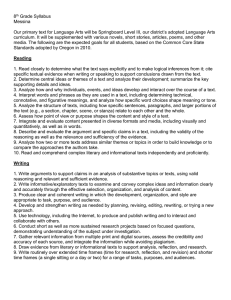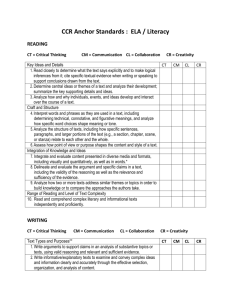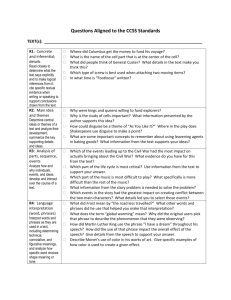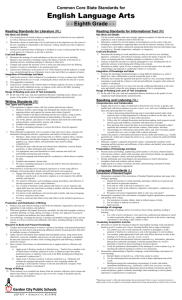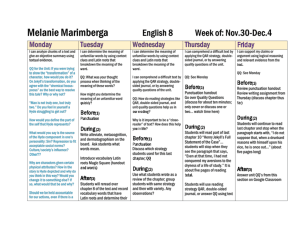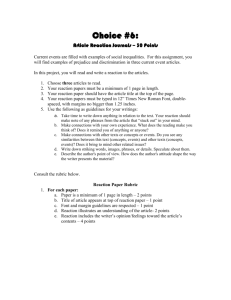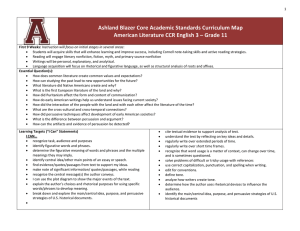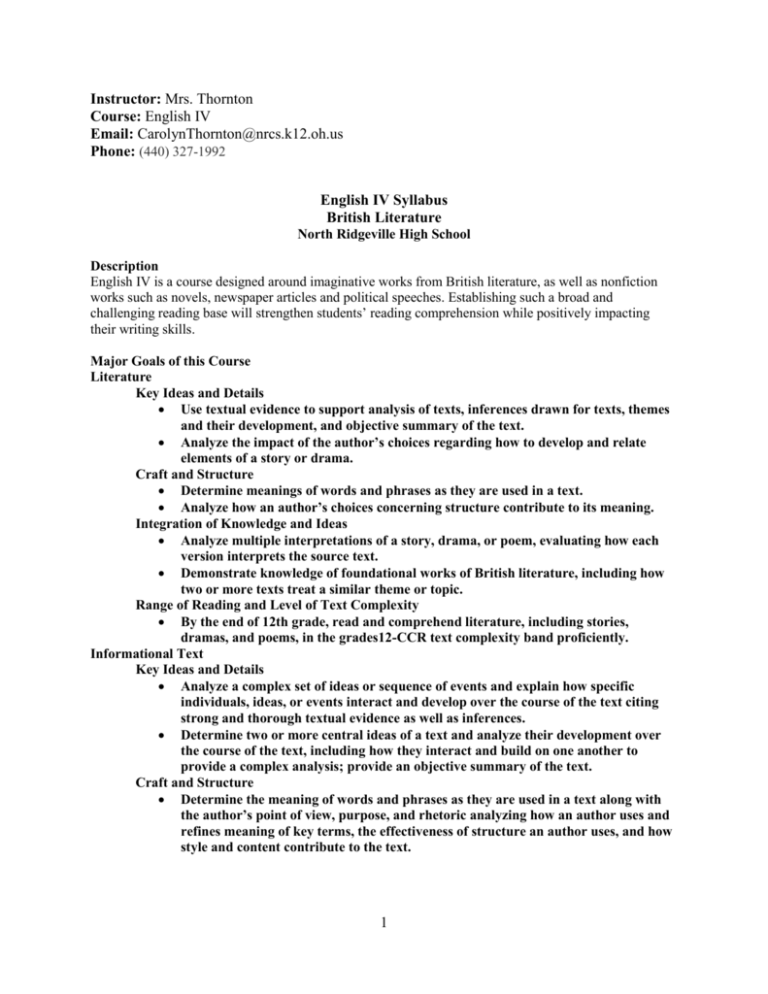
Instructor: Mrs. Thornton
Course: English IV
Email: CarolynThornton@nrcs.k12.oh.us
Phone: (440) 327-1992
English IV Syllabus
British Literature
North Ridgeville High School
Description
English IV is a course designed around imaginative works from British literature, as well as nonfiction
works such as novels, newspaper articles and political speeches. Establishing such a broad and
challenging reading base will strengthen students’ reading comprehension while positively impacting
their writing skills.
Major Goals of this Course
Literature
Key Ideas and Details
Use textual evidence to support analysis of texts, inferences drawn for texts, themes
and their development, and objective summary of the text.
Analyze the impact of the author’s choices regarding how to develop and relate
elements of a story or drama.
Craft and Structure
Determine meanings of words and phrases as they are used in a text.
Analyze how an author’s choices concerning structure contribute to its meaning.
Integration of Knowledge and Ideas
Analyze multiple interpretations of a story, drama, or poem, evaluating how each
version interprets the source text.
Demonstrate knowledge of foundational works of British literature, including how
two or more texts treat a similar theme or topic.
Range of Reading and Level of Text Complexity
By the end of 12th grade, read and comprehend literature, including stories,
dramas, and poems, in the grades12-CCR text complexity band proficiently.
Informational Text
Key Ideas and Details
Analyze a complex set of ideas or sequence of events and explain how specific
individuals, ideas, or events interact and develop over the course of the text citing
strong and thorough textual evidence as well as inferences.
Determine two or more central ideas of a text and analyze their development over
the course of the text, including how they interact and build on one another to
provide a complex analysis; provide an objective summary of the text.
Craft and Structure
Determine the meaning of words and phrases as they are used in a text along with
the author’s point of view, purpose, and rhetoric analyzing how an author uses and
refines meaning of key terms, the effectiveness of structure an author uses, and how
style and content contribute to the text.
1
Integration of Knowledge and Ideas
Delineate and evaluate the reasoning in seminal U.S. texts, including the application
of constitutional principles and use of legal reasoning, and the premises, purposes,
and arguments in works of public advocacy and 17th, 18th, and19th century
foundational documents of literary significance.
Integrate and evaluate multiple sources of information presented in different media
formats to address a question or solve a problem
Range of Reading and Level of Text Complexity
By the end of 12th grade, read and comprehend literary nonfiction in the grades 12CCR text complexity band proficiently.
Writing
Text Types and Purposes
Write arguments to support claims in an analysis of substantive topics or texts,
using valid reasoning and relevant and sufficient evidence.
Write informative/explanatory texts to examine and convey complex ideas, concepts,
and information clearly and accurately through the effective selection, organization,
and analysis of content.
Write narratives to develop real or imagined experiences or events using effective
technique, well-chosen details, and well-structures event sequences.
Production and Distribution of Writing
Produce clear and coherent writing in which the development, organization, and
style are appropriate to task, purpose, and audience developing and strengthening
writing as needed through planning, revising, editing, rewriting, trying new
approaches.
Use technology to produce, publish, and update individual or shared writing
products in response to ongoing feedback, including new arguments or information.
Research to Build and Present Knowledge
Conduct short as well as more sustained research projects to answer a question or
solve a problem; gathering information from multiple authoritative print and digital
sources, using advanced searches effectively drawing evidence from literary or
informational texts to support analysis, reflection, and research standard format for
citation.
Range of Writing
Write routinely over extended time frames and shorter time frames for a range of
tasks, purposes, and audiences.
Speaking and Listening
Comprehension and Collaboration
Initiate and participate effectively in a range of collaborative discussions with
diverse partners, building on others’ ideas and expressing their own clearly and
persuasively integrating multiple sources of information presented in diverse
formats in order to make informed decisions and solve problems.
Evaluate a speaker’s point of view, reasoning, and use of evidence and rhetoric,
assessing the stance, premises, links among ideas, word choice, points of emphasis,
and tone used.
Presentation of Knowledge and Ideas
Present information, finding, and supporting evidence, conveying a clear and
distinct perspective, such that listeners can follow the line of reasoning and
perspective using digital media to add interest.
2
Adapt speech to a variety of contexts and tasks, demonstrating a command of
formal English.
Language
Conventions of Standard English
Demonstrate command of the conventions of standard English grammar and usage
when writing or speaking.
Knowledge of Language
Apply knowledge of language to understand how language functions in different
contexts, to make effective choices for meaning or style, and to comprehend more
fully when reading or listening.
Vocabulary Acquisition and Use
Demonstrate understanding of figurative language, word relationships, and nuances
of word meaning clarifying the meaning of unknown and multiple meaning words
and phrases based on grades 11-12 reading and content, choosing flexibly from a
range of strategies.
Acquire and use accurately a range of general academic and domain-specific words
and phrases, sufficient for reading, writing, speaking, and listening at the career
and college readiness level; demonstrate independence in gathering vocabulary
knowledge when considering a word or phrase important to comprehension or
expression.
Methodology:
Seminars, lectures, large and small group discussions, individual study, projects, papers, and
conferences are all utilized
Selected films and other media, plus attending or viewing current productions are used to enrich
the learning experience
Presenting and observing various speech formats
Materials
You will need:
Lined paper, pens, and pencils for the entire school year.
1 – pack of sticky notes
1 – 2” binder
Skills and terminology:
Poetic Devices: figurative language, denotation, connotation, imagery, symbol, allusion, tone,
voice, theme, meaning and idea, musical devices, and rhythm and meter
Narrative and Dramatic Techniques: point of view, characterization, plot, setting, conflict,
structure, symbol, irony, themes, voice, tone, soliloquy, diction, imagery, structure, allusion,
figurative language
Essay Structure: compare & contrast, argumentative, expository, personal narrative. To show
respect to the recursive nature of writing, students will engage fully in the writing process by
brainstorming and writing rough drafts before turning in a final draft
o All essays will have listing (closed) thesis statements, follow the funnel method for
introductions and the ABC/TIQA format of topic sentence, evidence, analysis
o All essays will include transition words and/or sentences
o All essays will maintain tone appropriate for task and audience
o All essays will be in MLA format
Critical Thinking Skills: inference, analysis, logical reasoning, evaluation
3
Grammar & Mechanics: Types of phrases (noun, verb, appositive, adverbial, participial,
prepositional, absolute) and clauses (independent, dependent; noun, relative/adjective, adverbial).
Use of colon and semi-colon.
Research: You will complete a research paper between 7-10 pages in length that incorporates summaries,
paraphrases and direct quotes, cited in proper MLA format. Failure to turn in research paper will result in
an automatic failure for the grading period.
Standard Texts:
Feldman, Kevin. Prentice Hall Literature. Upper Saddle River, N.J: Pearson/Prentice Hall, 2007.
Odell, Lee. Elements of Language:6th Course. Austin: Holt Rinehart and Winston, 2005.
Shostak, Jerome. Sadlier-Oxford Vocabulary Workshop: New Edition, Level G. New York: SadlierOxford, 2005.
Works by Title
Course Description—Note that some of the titles are subject to change
Beowulf
Macbeth
The Canterbury Tales
Sir Gawain and the Green Knight
Morte d’Arthur
Poetry Unit
Research
Assessment:
A variety of essays, multiple choice tests, projects, group and individual presentations
North Ridgeville Grading Scale:
A
92.5-100%
A89.5 - 92%
B+
87-89%
B
83-86%
B
80-82%
C+
77-79%
C
73-76%
C70-72%
D+
67-69%
D
63-66%
D60-62%
F
<59.5%
Academic Honesty:
If you turn in work that is not your own, or if you use a source and don’t reference it, you will receive a
“zero” on the assignment.
4
Rules and Procedures:
When you enter the room: Always look to the SmartBoard for information. Often there will be a
definition for you to copy down or a quick activity to complete while I take attendance and prepare to
begin class.
Group Work: We will do a lot of group work in class. It is important that if I need to give you some
information you focus quickly and quietly to be respectful to your classmates. I will say, “I need all eyes
up here” and you should stop your conversation and quietly look to where I am standing. This will give
you more time to work with your group!
Absences: If you are absent or miss class for any reason, please look at PowerSchool to see what
documents and presentations you missed from the previous class day. Then, ask a friend what you missed.
See me about any questions, or to schedule make up tests or quizzes. I am your THIRD resource. Only
come and ask me if you are unable to obtain the information you missed from PowerSchool or a friend
first.
Homework: Expect assignments daily. Make sure your homework is turned in at the beginning of class in
the designated bin for your class period. You are seniors now and it is your responsibility to make sure
your assignments make it into the right place on time. When typed homework is due, you must bring the
work printed out unless you have already discussed an alternative with me.
Hall Pass: Please do not ask to leave the room during class. If an emergency does occur, ask to leave the
room at a non-disruptive time. Only one student is permitted to leave the room at a time.
5

